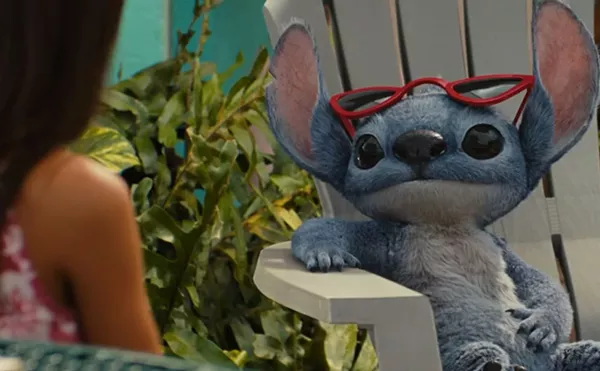
Audio By Carbonatix
[
{
"name": "GPT - Leaderboard - Inline - Content",
"component": "35519556",
"insertPoint": "5th",
"startingPoint": "3",
"requiredCountToDisplay": "3",
"maxInsertions": 100,
"adList": [
{
"adPreset": "LeaderboardInline"
}
]
}
]
Watching Pauline and Paulette, the feature debut by Belgian writer-director Lieven Debrauwer, one becomes increasingly dismayed at the yawning gap between what the film aspires to be and what’s actually on the screen. Combining two subjects that cry out for careful tending — aging and mental retardation — the film plods along with steady and shallow steps, alternately clichéd, cute and appallingly sentimental.
Pauline (Dora van der Groen) is a severely retarded 66-year-old woman who lives with her slightly younger sister, Martha (Julienne De Bruyn). Pauline’s unable to tie her shoes or spread jam on her bread. She speaks almost solely in fragmented non sequiturs and has a short-term memory which switches on and off at random; she’s the kind of screen simpleton invariably described as “childlike,” though in order to do so one must have an extremely distorted, not to mention very low, opinion of children.
Although, to her credit, van der Groen (a respected actress in Belgium) doesn’t try to make Pauline endearing, she seems to err on the side of some misguided idea of verisimilitude. Alternating between a secret little smile and a frankly disturbing wide-eyed stare into nothing, she gives the impression of having been whacked on the head with a heavy object before each scene. It’s an uncompromising performance, but depicting Pauline idling on such a thin beam of consciousness throws the whole movie out of whack. She belongs in a grimmer and more honest scenario than this one.
Pauline adores her older sister, Paulette (Ann Peterson), a rather grotesque piece of work who’s a diva in their small town’s operetta company and who also operates a kitschy fabric store which is a nightmare of bright primary colors and flowered wrapping paper. Paulette is a dainty wannabe in the body of a sumo wrestler, a petty tyrant to her sisters and a grinning supplicant to her customers. Pauline is oblivious to Paulette’s dislike of her presence, attracted to the candy-colored decor of the shop and especially to the flowered paper, pieces of which she keeps in a scrapbook.
One day Martha (understandably, given the strain of having to take care of her sister) drops dead as a doornail, leaving a will that stipulates that in order for Paulette and a fourth sister, Cecile (Rosemarie Bergmans), to inherit any of her money or property, one of them must take care of Pauline. Each gives it a try before giving up in frustration. Cecile, much younger than the other sisters, seems sympathetic enough, but her boyfriend, Albert (Idwig Stepahane), can’t stand the old gal.
Albert is supposed to be the one clear villain of the piece and the signifiers fit the film’s goopy schematic — he’s blatantly intellectual and so unable to appreciate Pauline’s scampish obtuseness. When she rips a page out of one of his art books, his anger at having this destructive and uncontrollable person in his house is supposed to seem like hard-hearted churlishness. For anyone who has ever had the urge to dropkick one of the Von Trapp children into the next valley, this is where the gorge rises.
Eventually some unlikely rapprochement between Pauline and one of her sisters is arrived at, in what one suspects is meant to be a feel-good ending. But I find it incomprehensible how anyone could actually be moved by this film, so miserably inept are its attempts at manipulation and so singularly unlovable is its central character. This seems to be a minority opinion and some reviewers have likened Pauline and Paulette to one of the old neo-realist classics (Umberto D. has actually been mentioned by name), which would be depressing if it weren’t so absurd.
Pauline and Paulette is a long way from realism, neo- or otherwise. Rather, it’s one of those films that presents retardation as a state of grace, it’s heroine blissfully oblivious as she stands in her garden and waters the pretty flowers, at one with nature in her dazed act of repetition. Rather than challenge us with the idea that some natural suffering is inhumane and that empathy can reach frustrating and final dead ends, it takes the cozy point of view that everything will be for the better if we just lighten up and be nice. It’s meant to reassure us in our limitations and it’s fake, fake, fake.
Showing exclusively at the Detroit Film Theatre (inside the DIA, 5200 Woodward Ave., Detroit), Friday through Sunday. Call 313-833-3237.
Richard C. Walls writes about the arts for Metro Times. E-mail him at letters@metrotimes.com.





